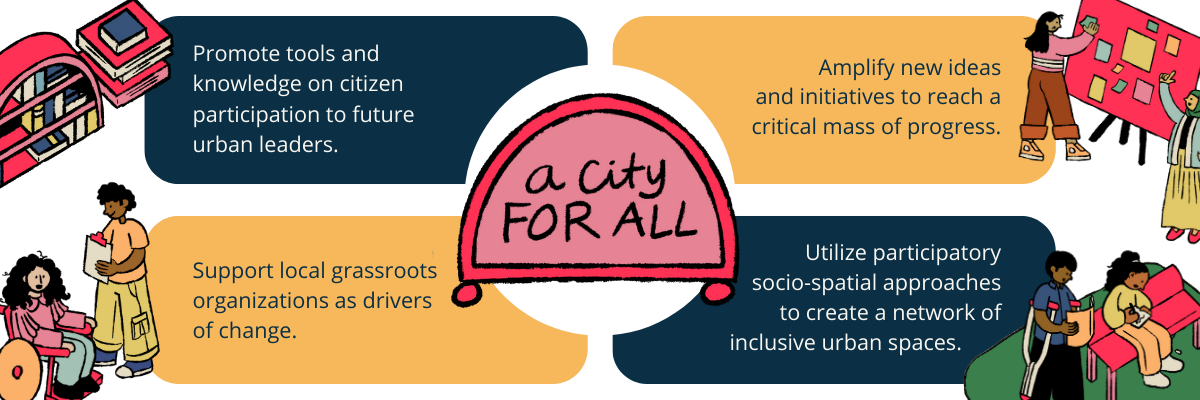Type
blogs
2023 Vision: Strengthening Urban Citizenship to Build a City for All
Vanesha Manuturi
Tue, 31 Jan 2023

4 min read
When Kota Kita was established more than a decade ago, we were driven by the urgency to facilitate meaningful citizen participation in a post-Reformasi Indonesia. We have always believed that citizens must be at the heart of the decision-making process determining the environment and the quality of living of the urban centers they reside in. Over the years, our experience has shown us, time and time again, that when citizens and stakeholders understand urban issues and work together, spaces and services improve, fundamental rights are fulfilled, and marginalized communities become empowered.
Through our work in 2022, for instance, we saw how citizens in Pelambuan and Kelayan Barat, Banjarmasin advocated for their right to create and shape an inclusive public space where everyone, particularly mothers, children, elderly, and persons with disabilities, can enjoy, commune, and even learn new skills together. We have also seen fisherfolks in coastal areas of Semarang and women organizers in dense settlements of Jakarta mobilize to renegotiate their rights to decent livelihoods. On the other hand, we also saw challenges growing even more complex last year. Poor and marginalized communities continue to be threatened by the impact of the climate crisis and the aftermath of the COVID-19 pandemic. At the same time, spaces for civic participation—which were already limited, to begin with—have further shrunk amidst a rise in hyper-development policies. Internally, as an organization, we also faced the uncertainties brought on by the pandemic, with several key activities and plans having to be halted or postponed. Having met both the challenges and opportunities faced by our cities in the past year, we became further convinced that active urban citizenship, driven by empowered and informed citizens, is needed now more than ever to ensure a safer and better urban future for all.
So, what is Kota Kita's part in the mission? As a resource center for urban development issues, we have accumulated years of insights, knowledge, and practices through our work facilitating citizen participation in cities. Thus, starting in 2023, we are determined to consolidate these assets in our mission to further strengthen inclusive and meaningful citizenship in Indonesian cities and beyond.
There are four pathways that we have identified to achieve this goal: promote more tools and knowledge on citizen participation to future urban leaders; provide support to local, grassroots organizations as drivers of change; utilize participatory socio-spatial approaches to create a network of inclusive urban spaces; and amplify new ideas and initiatives to reach a critical mass of progress.

These pathways are currently already embedded in Kota Kita through existing programs such as Urban Citizenship Academy, an initiative to engage a new generation of young leaders and support them in solving pressing urban problems; Urban Social Forum, our annual forum for exchanging knowledge, debating ideas, and networking between civil society organizations, activists, academics, and students; and Community-Centric Design, an initiative to promote a co-creation design process that cultivates the active participation of under-resourced underprivileged and marginalized communities in improving their living space.
But this year, we plan to develop an organizational-level strategy further to strengthen the reach and impact of the programs. In addition to the programmatic approach, we seek to enhance these pathways internally through various capacity-building and knowledge-sharing efforts. This includes publishing our project learnings and producing thematic communication products to encourage other civil society organizations, government officials, academics, and the public in making inclusive and meaningful decisions to shape their cities. We will also be celebrating the tenth edition of the Urban Social Forum this year, marking a decade of facilitating a space for exchanging knowledge, debating ideas, and networking between civil society organizations, activists, academics, and students working on pressing urban issues.
The effort to build better cities for all is a massive task that demands progress at a systemic and structural level. However, we are hopeful that by activating more spaces for meaningful citizen participation, we can contribute to the creation of more inclusive, democratic, and resilient cities in Indonesia and beyond. If you are also passionate about citizen participation and urban development, reach out to us and let’s collaborate!
